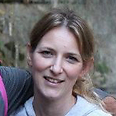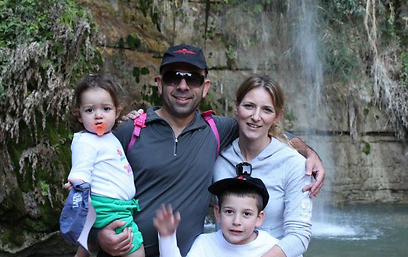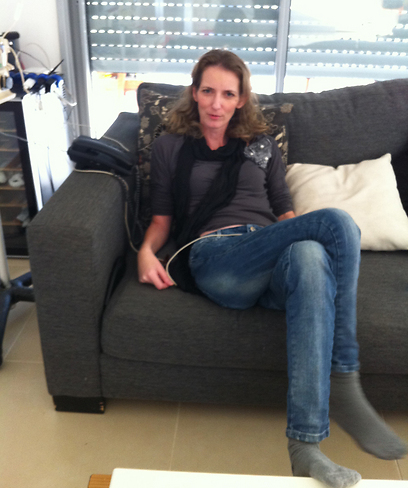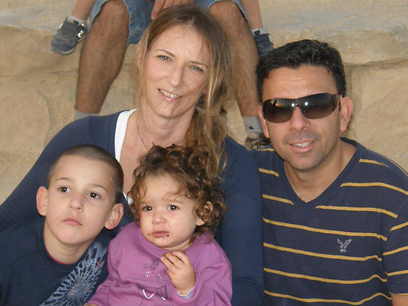
Only several weeks ago, after an extremely difficult year, the many symptoms she suffered from were finally given a name - Autoimmune Autonomic Ganglionopathy, a rare disorder of the autonomic nervous system. This system affects heart rate, digestion, respiratory rate, salivation and perspiration, among other things.
"I've always been very healthy," Amor tells Ynet. "About a year ago, I began suffering from diarrhea and constant stomach aches and started losing weight. When the pain became intolerable, I went to the hospital with the first constipation of seven I have suffered from since then."

Tali Amor and her family before illness struck
Amor was treated at the hospital in a conventional manner and the bowel obstruction was removed, but several days later she was back at the hospital with the same condition.
"I spent five days at home, 10 days at the hospital, home again, another bowel obstruction, and so on and so forth," she recounts. "The third time I underwent surgery, because the constipation could not longer open on its own, and part of my obstructed bowel was removed."
Amor returned home to her two small children, aged three and seven today, feeling a certain improvement in her condition. She even went back to work at the Cellcom company's finance division, but the stomach aches soon came back to haunt her. She continued losing weight, reaching 46 kilograms (101 pounds) – down 20 kilograms from her original weight.
'I couldn't get out of bed'
Throughout those terrible months Amor took many tests, but doctors failed to reach a conclusion about her condition. A biopsy was taken from the obstructed bowel part removed from her body, but there were no pathological findings.
"I was still suffering from stomach aches," she says, "and I started going to private doctors to see if anything else could be done. One of them sent me to (the Chaim Sheba Medical Center at) Tel Hashomer, for further hospitalization and a long series of tests. They found nothing there either, but because I was still losing weight and had already gone down 20 kilos, they decided to connect me to a feeding tube."
Amor was discharged, but failed to gain weight despite the feeding tube.
"On the contrary, my condition just deteriorated," she says. "I suddenly began suffering from double vision and had to shut one eye to be able to see properly. I kept attributing this condition to my weight loss and the fact that I wasn’t feeling well, but when my brother saw my condition he was shocked and called the doctor to ask what we should do."

Amor, today, with feeding tube
The doctor they called said she should be rushed to the emergency room, as the situation required neurological care.
"From that moment I was hospitalized for three months for a comprehensive inquiry. I was worn out, couldn't get out of bed and could barely walk," Amor recounts painfully.
What was the turning point in your treatment?
"One of the doctors suddenly had a breakthrough, connecting all my symptoms to the autonomic nervous system. When they began looking in this direction, they arrived at a very rare disorder called Autoimmune Autonomic Ganglionopathy, which is discussed in very few articles on the Web, in English of course – because it doesn’t exist in Israel.
"They began running further tests to confirm this diagnosis, and sent an antibody screen to the United States, to a doctor in Texas who specializes in this disorder.
"In the meantime, they decided not to wait for the results and began treatment, which is more symptomatic but is meant to take care of the over-activation of the immune system which is damaging the body."
One of the exhausting treatments Amor is going through is called plasmapheresis – plasma exchange.
"They remove all the blood from the body," she explains, "into a machine separating the red blood cells from the plasma fluid, and then they return the red blood cells and a plasma substitute to the body. It's an extremely weakening treatment, and after the first rounds I just couldn't get out of bed anymore."
'I asked them to find something already'
The official results arrived from Texas just recently, revealing that Amor's condition is considered borderline.
"My antibody level is lower than people who have this illness," she explains, "but it's very high compared to a healthy person. This disease is said to strike and stop, so it's possible that my antibodies were checked after the disease stopped striking."
Were you happy when they finally realized what you had?
"I felt very relieved when someone finally gave a name to what I was going through. We waited for a diagnosis, and each time someone would ask if they could get me anything, I would say, 'Just a diagnosis. I don't need anything else – just a diagnosis.' This situation, without a diagnosis, was very difficult all the way through.
"They searched my entire body for a tumor which may be secreting substances, and each time I would start crying and ask them to just find something already, because I could deal with anything – just tell me what it is already.
"Naturally, I was happy the moment they reached a diagnosis, and it was the same with every test supporting the diagnosis – even though it's not a simple disease."

Husband took care of children. Amor and her family
Amor is still receiving medical treatment and completely depends on it. She is fed through a tube connected to her stomach, and her recovery is very slow.
"The damage caused by the disease must be treated, especially in my digestive system," she says. "It's unclear if the damage is even reversible. I can't walk around a lot, can’t take care of the children."
Who took care of them throughout this difficult year?
"My husband took care of them and made sure to keep them on a fixed routine. We explained to the little one that mommy's tummy hurts, and the older one understood a bit more. He would visit me while I was hospitalized, but it was more difficult for the little one.
"Our family and friends offered to help too, and there are not enough words to explain how moving that is."
Chances of recovery unclear
"We don't know if the disease will strike again," says Amor. "There is not much knowledge about the chances. At the moment we have to deal with the damage sustained by my body and get me back on track. Some of the doctors believe I will go back to being 100% like before, and some are not so sure. Not one can estimate the extent of the damage."
What do doctors even know about this disease?
"It’s a disorder which is documented in global medical literature, and the doctors here consulted many doctors abroad. They all agree about the treatment I'm receiving, but they all share the same doubts over the chances of recovery.
"As far as I know, there are only several dozen patients in the world suffering from this disease. In Israel, doctors are cautious about determining that no one else has it, but they all say that they have not seen a case like mine in the past 20 years, and doctors from other countries they spoke to share the same opinion on its scarcity."
Amor undergoes the plasma exchange treatment once a month, and is examined by different doctors on an almost daily basis.
"That's my job now, visiting doctors," says sadly. "I used to work in Cellcom, and they were simply amazing – sensitive and supporting even when I didn’t feel good and had to leave for medical tests in the middle of the day. Everyone is still in touch with me, even a year later, as if I'm still a regular worker there."
Is it your dream today to go back to work?
"My dream is to go back to being Tali, because I'm not the same person now. I want to begin functioning at home again, to be with the children, entertain – to be all the things that are me."















